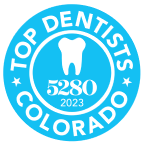 Receding gum tissue may be the result of over-brushing, smoking, gum disease, or genetics. Gum graft surgery, also known as periodontal surgery, is a procedure that a dentist can use to treat gum recession. It involves taking tissue from the roof of the mouth or a tissue bank and transplanting it onto the affected area of the gum line.
Receding gum tissue may be the result of over-brushing, smoking, gum disease, or genetics. Gum graft surgery, also known as periodontal surgery, is a procedure that a dentist can use to treat gum recession. It involves taking tissue from the roof of the mouth or a tissue bank and transplanting it onto the affected area of the gum line.
Untreated gum recession can lead to significant health issues, including tooth loss. At Metropolitan Dental Care, we can help you address receding gums with safe and effective gum graft surgery. Schedule a consultation with our dentists in Denver, CO, by calling (303) 534-2626 now.
After undergoing gum graft surgery, it is important to take proper care of the surgical site to promote healing and reduce the risk of complications. In this blog, we discuss what to do after gum graft surgery.
Follow Your Dentist’s Postoperative Instructions
After gum graft surgery, your dentist or periodontist will provide you with postoperative instructions. Your healthcare team specifically designs these instructions to help you manage your recovery for optimal healing.
These instructions may include information on how to care for your surgical site, what to eat and drink, and what medications to take. It is important to follow these instructions carefully to encourage speedy healing and reduce the risk of complications.
If you do not receive postoperative care instructions, then contact your healthcare team as soon as possible. They may be able to send written instructions via email or provide verbal guidance over the phone.
Rest and Avoid Strenuous Activity
Following gum graft surgery, patients should take it relatively easy. This means avoiding strenuous activity (like exercise, yard work, or heavy lifting) for roughly 72 hours. Otherwise, it may take significantly longer for gum grafts to heal.
Manage Residual Pain
You may experience some residual pain or discomfort after gum graft surgery. This is very common and completely normal.
Prescription and over-the-counter painkillers can help alleviate any pain. However, be sure to closely follow the instructions on the label or packaging, and never exceed the recommended dosage.
Keep Swelling Down
Gum graft surgery can be a little hard on our oh-so-delicate gum tissue. So, it’s extremely common for patients to experience some swelling after gum grafts.
Inflammation at the surgical site can cause discomfort, and it can leave the gums vulnerable to infections and cellular damage. To keep swelling at bay, we recommend applying ice packs for 20 minutes at a time with at least 20-minute breaks in between icing sessions.
Eat Softer Foods
You may need to follow a softer diet for several days after gum graft surgery. We recommend nutrient-dense foods, like:
- Soups and stews
- Protein shakes
- Meal-replacement drinks
- Scrambled eggs
- Tofu
Keep Brushing and Flossing!
Maintaining good oral hygiene after gum graft surgery is key to a successful procedure. So, that means patients should continue to gently floss once a day and brush at least twice daily for infection control and optimal healing.
Gum Graft Surgery in Denver, CO
Gingival recession is a progressive dental issue that imperils the health of your smile. Gum graft surgery in Denver, CO, can repair gum tissue for enhanced oral health and function. Schedule an appointment at Metropolitan Dental Care to see if this health-saving procedure is right for you. Call our team at (303) 534-2626 or send us a message here to get started today.

